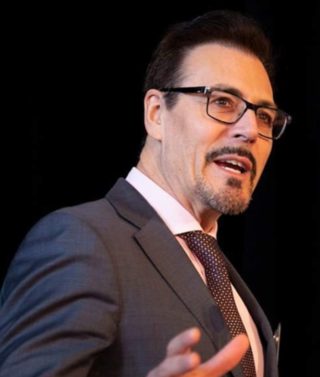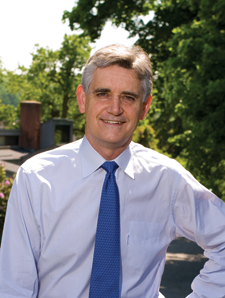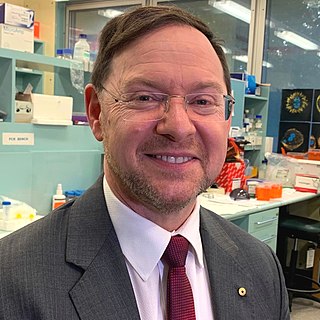Related Research Articles

John Frederick Joseph Cade AO was an Australian psychiatrist who in 1948 discovered the effects of lithium carbonate as a mood stabilizer in the treatment of bipolar disorder, then known as manic depression. At a time when the standard treatments for psychosis were electroconvulsive therapy and lobotomy, lithium had the distinction of being the first effective medication available to treat a mental illness.
The University of Texas Southwestern Medical Center is a public academic health science center in Dallas, Texas. With approximately 23,000 employees, more than 3,000 full-time faculty, and nearly 4 million outpatient visits per year, UT Southwestern is the largest medical school in the University of Texas System and the State of Texas.

WEHI, previously known as the Walter and Eliza Hall Institute of Medical Research, and as the Walter and Eliza Hall Institute, is Australia's oldest medical research institute. Sir Frank Macfarlane Burnet, who won the Nobel Prize in 1960 for his work in immunology, was director from 1944 to 1965. Burnet developed the ideas of clonal selection and acquired immune tolerance. Later, Professor Donald Metcalf discovered and characterised colony-stimulating factors. As of 2015, the institute hosted more than 750 researchers who work to understand, prevent and treat diseases including blood, breast and ovarian cancers; inflammatory diseases (autoimmunity) such as rheumatoid arthritis, type 1 diabetes and coeliac disease; and infectious diseases such as malaria, HIV and hepatitis B and C.

Memorial Sloan Kettering Cancer Center is a cancer treatment and research institution in Manhattan in New York City. It was founded in 1884 as the New York Cancer Hospital. MSKCC is one of 72 National Cancer Institute-designated Comprehensive Cancer Centers. It had already been renamed and relocated, to its present site, when the Sloan-Kettering Institute for Cancer Research was founded in 1945, and built adjacent to the hospital. The two medical entities formally coordinated their operations in 1960, and formally merged as a single entity in 1980. Its main campus is located at 1275 York Avenue between 67th and 68th Streets in Manhattan.

Donald Metcalf AC FRS FAA was an Australian medical researcher who spent most of his career at the Walter and Eliza Hall Institute of Medical Research in Melbourne. In 1954 he received the Carden Fellowship from the Anti-Cancer Council of Victoria; while he officially retired in 1996, he continued working and held his fellowship until his death in December 2014.
Jacques Francis Albert Pierre Miller AC FRS FAA is a French-Australian research scientist. He is known for having discovered the function of the thymus and for the identification, in mammalian species of the two major subsets of lymphocytes and their function.

Richard G. Pestell is an Australian American oncologist and endocrinologist who is Distinguished Professor, Translational Medical Research, and the President of the Pennsylvania Cancer and Regenerative Medicine Research Center at the Baruch S. Blumberg Institute. He was previously Executive Vice President of Thomas Jefferson University and Director of the Sidney Kimmel Cancer Center of Thomas Jefferson University. Pestell was appointed an Officer of the Order of Australia in the 2019 Queen's Birthday Honours for distinguished service to medicine and medical education.
The International Cancer Genome Consortium (ICGC) is a voluntary scientific organization that provides a forum for collaboration among the world's leading cancer and genomic researchers. The ICGC was launched in 2008 to coordinate large-scale cancer genome studies in tumours from 50 cancer types and/or subtypes that are of main importance across the globe.
John David Pollard, FRACP, FRCP (Lond), AO, born 6 January 1941, is professor of neurology at the University of Sydney, Australia. He attended Sydney Boys High School from 1953-58. After graduating with honours in a Bachelor of Science (medical) from the University of Sydney in 1964, he went on to study medicine at the same institution, graduating with honours in 1966 and completing a PhD studying nerve transplantation in 1973. He trained in neurology at Royal Prince Alfred Hospital, Sydney, and subsequently as research fellow and registrar at the Royal Free Hospital and the National Hospital for Neurology and Neurosurgery, Queen Square, London.
Molecular oncology is an interdisciplinary medical specialty at the interface of medicinal chemistry and oncology that refers to the investigation of the chemistry of cancer and tumors at the molecular scale. Also the development and application of molecularly targeted therapies.

Bruce William Stillman, AO, FAA, FRS is a biochemist and cancer researcher who has served as the Director of Cold Spring Harbor Laboratory (CSHL) since 1994 and President since 2003. He also served as the Director of its NCI-designated Cancer Center for 25 years from 1992 to 2016. During his leadership, CSHL has been ranked as the No. 1 institution in molecular biology and genetics research by Thomson Reuters. Stillman's research focuses on how chromosomes are duplicated in human cells and in yeast Saccharomyces cerevisiae; the mechanisms that ensure accurate inheritance of genetic material from one generation to the next; and how missteps in this process lead to cancer. For his accomplishments, Stillman has received numerous awards, including the Alfred P. Sloan, Jr. Prize in 2004 and the 2010 Louisa Gross Horwitz Prize, both of which he shared with Thomas J. Kelly of Memorial Sloan-Kettering Cancer Center, as well as the 2019 Canada Gairdner International Award for biomedical research, which he shared with John Diffley.

The Centenary Institute of Cancer Medicine and Cell Biology, commonly referred to as the Centenary Institute or Centenary, is an Australian medical research institute located at the Camperdown campus of the University of Sydney, in Sydney, New South Wales. The research programs at Centenary focus on a diverse range of human health issues including cancer, cardiovascular disease, genetic diseases, immunology, infectious diseases and liver disease.
Pamela J. Russell was an Australian academic researcher of immunology, bladder and prostate research. Russell was awarded Membership of the Order of Australia (AM) for her research on prostate and bladder cancer in 2003.
David Albert Cooper was an Australian HIV/AIDS researcher, immunologist, professor at the University of New South Wales, and the director of the Kirby Institute. He and Professor Ron Penny diagnosed the first case of HIV in Australia.

John E. J. Rasko AO is an Australian clinical hematologist, pathologist and scientist whose research focuses on gene and stem cell therapy, experimental haematology and molecular biology. He directs the Department of Cell and Molecular Therapies at Royal Prince Alfred Hospital, heads the Gene and Stem Cell Therapy Program at the Centenary Institute, Sydney, and is Professor of Medicine, Sydney Medical School, the University of Sydney. He is a science communicator, often interviewed on Australian radio and television, and is a regular contributor to Breakfast, Radio National, ABC. Rasko delivered the ABC's 2018 Boyer Lectures. Entitled Life Re-engineered, they examined the history and impact of gene and cell therapies.
Malcolm William Broomhead is an Australian businessman who has held various directorships and senior positions in the Australian engineering, industrial and resources sectors. As of 2018, he is a director of BHP and Chairman of Orica. Journalist Andrew Crook wrote of Broomhead in 2012 that "nobody is more connected in Australian business".
Misty Rayna Jenkins is an Australian scientist known for her research into lymphocytes and cancer treatment.
Georgina Venetia Long is Co-Medical Director of the Melanoma Institute Australia (MIA), and Chair of Melanoma Medical Oncology and Translational Research at MIA and Royal North Shore Hospital, The University of Sydney.
Melanie Ann Wakefield is an Australian psychologist and behavioural researcher at the Cancer Council of Victoria. She has worked extensively on cancer prevention including tobacco control, through the introduction of plain-paper packaging.
References
- ↑ "Professor Joseph Trapani". Harry Perkins Institute of Medical Research . Retrieved 26 January 2024.
- ↑ "Officer of the Order of Australia (AO) in the General Division" (PDF). Governor-General of Australia. p. 58. Retrieved 26 January 2024.